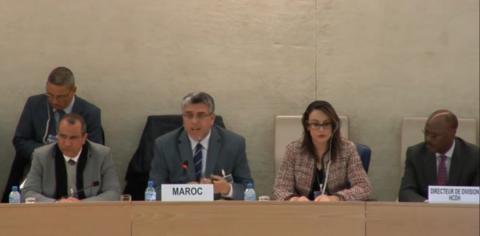
On 5 May 2017, the Working Group on the Universal Periodic Review (UPR), established by the Human Rights Council (HRC), adopted a draft report containing the recommendations made by United Nations Member States to Morocco during the State’s review on 2 May 2017. While Member States welcomed the efforts made since the last UPR, they however expressed concern over the persistence of torture, death penalty, harassment of journalists as well as undue restrictions to the rights to freedom of expression, association and peaceful assembly. These issues were brought to the attention of UN Member States in Alkarama’s report of September 2016 submitted to the HRC ahead of Morocco’s review. Among other issues raised by Members States were violence against women and the non-incrimination of marital rape, education, children’s rights and the persistence of child marriage.
Practice of torture and death penalty
Despite the ratification of the Convention against Torture and Other Cruel, Inhuman or Degrading Treatment or Punishment (UNCAT) since 1993, and as emphasised in Alkarama’s report, torture remains of concern in Morocco with serious violations remaining unpunished. In 2013, following his country visit, the Special Rapporteur on torture reported that although the practice significantly declined since 2011, it still occurs during the arrest and the police custody period in cases of State security, including terrorism and membership to or support of movements for the independence of Western Sahara. The main issue remains the lack of effective, prompt and independent investigation when allegations of torture are made by detainees before judicial authorities. During the UPR, several Member States, including Greece, Guatemala, Spain and Switzerland, recommended Morocco to bring the definition of torture in line with the UNCAT and establish an independent, effective and well-resourced national preventive mechanism against torture in compliance with the Optional Protocol to the UNCAT.
Bearing in mind Morocco’s rejection of the principle of a de jure abolition of the death penalty during its second review, numerous Member States, including France, Montenegro, Italy, South Africa, Estonia, Australia, Belgium and Norway, nonetheless renewed their recommendation to ratify the Second Optional Protocol to the International Covenant on Civil and Political Rights, aiming at its absolute abolition. They further encouraged Morocco to maintain the current de facto moratorium on the use of death penalty. In fact, and as emphasised in Alkarama’s report, even though not applied de facto, the capital punishment remains at the top of the criminal penalties hierarchy and applies to crimes of aggravated homicide, torture, armed robbery, arson, treason, desertion, and attempt on the life of the King or any member of the royal family.
Infringements to freedoms of expression, association and peaceful assembly
In spite of Morocco’s efforts since its second UPR, the right to freedom of opinion and expression is still not fully guaranteed. As underlined in Alkarama’s report, since 2012, charges are still brought against journalists for “insulting the King” or “undermining the territorial integrity” while commenting on the status of Western Sahara. In addition, organising demonstrations remains difficult in practice for political parties, trade unions and associations, and requires prior governmental authorisation. In its report, Alkarama had recalled that only officially registered NGOs are allowed to organise demonstrations and that police forces regularly resort to excessive and unjustified use of force in order to disperse peaceful demonstrations.
During the review, several Member States, including Denmark, France, Qatar, Netherlands, Sweden, US and Ireland, echoed Alkarama’s concerns recommending Morocco to fully ensure freedoms of expression, information, peaceful assembly and association, and to create a safe environment for human rights defenders and civil society to carry out their peaceful activities. They further recommended Morocco to remove all obstacles to associations seeking registration and to end the prosecution of journalists and other individuals detained solely for peacefully exercising their civil and political rights.
Lack of efficiency and independence of national human rights mechanisms
Despite Morocco’s commitment to strengthen its national human rights institutions and efforts to better protect human rights, notably through the establishment of a Consultative Council for Human Rights and a National Preventive Mechanism – which role is assumed by the National Council for Human Rights –, Alkarama noted that the scope of these mechanisms remains in practice restricted. In its report Alkarama further raised several shortcomings, in particular their lack of efficiency and independence, and called on Member States to recommend Morocco to ensure the full independence and efficiency of the national human rights mechanisms vis-à-vis the executive.
Echoing Alkarama’s concerns, several Member States, among which Philippines, Togo, Republic of Korea, Bahrain, Central African Republic and Madagascar, encouraged Morocco to continue its efforts to establish and consolidate the role and capacity of national institutions and mechanisms for a better promotion and protection of human rights.
What is next?
Overall, Morocco received 244 recommendations from UN member States, which the country must consider before September 2017 and inform the Human Rights Council of whether these are accepted or rejected. The State should then implement the accepted recommendations until its fourth UPR cycle in 2021, in order to improve the human rights situation on the ground.
For more information or an interview, please contact the media team at media@alkarama.org (Dir: +41 22 734 1008).
